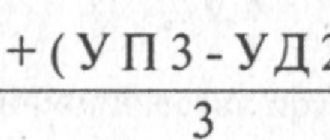Profession as work activity and phases of a professional’s life path
A profession as a work activity has its own structure. It can be described as follows:
– given goals, ideas about the result of work;
– a given object (the source material is not necessarily a thing, but also a situation of uncertainty, any system, for example, social, symbolic, artistic-aesthetic, etc.);
– a system of means of labor (depending on the subject, they differ significantly from each other);
– system of professional job responsibilities (specified job functions);
– system of rights;
– production environment, subject and social working conditions.
Personal changes that occur during professional activity lead to the formation of the individual as a subject of activity. The professional development of a subject is understood as the movement of the individual in the course of professional work. The professional development of a subject unfolds in time and covers the period from the beginning of the formation of professional intentions to the finish line, which ends active professional activity.
Literature
- Ananyev, B.G. Man as an object of knowledge / B.G. Ananyev. - L.: Leningrad State University Publishing House, 1968. - 339 p.
- Asmolov, A.G. Basic principles of psychological analysis in activity theory / A.G. Asmolov // Questions of psychology. - 1982. - No. 2. - P. 14–27.
- Baturin, N.A. The influence of success and failure on the functional state and performance: dis. ...cand. psychol. Sciences / N.A. Baturin. - L., 1980. - 166 p.
- Baturin, N.A. The final stage of activity and the problem of mechanisms of interactional regulation / N.A. Baturin // Theoretical, experimental and practical psychology: Collection of scientific works. - Chelyabinsk: South Ural State University Publishing House, 1998. - T. 1. - P. 3–12.
- Baturin, N.A. Level of aspirations as a method of personality research / N.A. Baturin, N.A. Kurgansky // Diagnosis of mental states in normal and pathological conditions. - L., 1980. - P. 140–148.
- Bernstein, A.L. Handbook of statistical solutions / A.L. Bernstein. - M.: Statistics, 1968. - 162 p.
- Borozdina, L.V. Study of the level of aspirations / L.V. Borozdina. - M.: Publishing house of the Institute of Psychology of the Russian Academy of Sciences, 1993. - 140 p.
- Gerbachevsky, V.K. Level of aspirations and characteristics of intelligence / V.K. Gerbachevsky // Psychodiagnostic methods (in a complex longitudinal study of students). - L.: Leningrad State University Publishing House, 1973. - P. 101–105.
- Konopkin, O.A. Psychological mechanisms of activity regulation / O.A. Konopkin. - M.: Nauka, 1980. - 256 p.
- Heckhausen, H. Hoffnung and Purcht in der Leitungsmotivation / H. Heckhausen. - Meisenheim/Glan: Nainf, 1963. - 387 p.
Source: Baturin N.A. Success and failure as factors in the relationship between previous and subsequent activities // Bulletin of the South Ural State University. Series: Psychology. 2021. T. 11. No. 3. P. 5-12. DOI: 10.14529/psy180301
December 7, 2021 is the anniversary of Nikolai Alekseevich Baturin , a famous specialist in the field of general psychology and psychodiagnostics, founder and first dean of the Faculty of Psychology of South Ural State University, the first in the Southern Urals. “Psychological Newspaper” congratulates Nikolai Alekseevich and wishes him health for many years to come, inspiration and strength to implement all his ideas and plans!
The following phases of a professional’s life path are distinguished:
1) Optant or option phase. In this period, a person faces the problem of choosing a profession or a forced change of profession and makes his choice. This problem can arise for teenagers, future high school graduates, and professionals. This phase ends with the formation of a realistic idea of the world of work and one’s place in it, the emergence of a professional plan.
2) Adept or training phase. Over the course of many years of professional training, the subject of educational and professional activity experiences significant changes in self-awareness, direction, awareness, and skill.
3) Phase of adaptation of a young specialist to work. There are differences in the social and activity standards of the educational institution and the production team. In this regard, a specialist must understand and feel the new norms governing his behavior, lifestyle, manners, appearance, master the “technological” subtleties of the profession and must learn to comply with these norms. A professional must adapt to the job.
4) Internal phase. At this stage of development, a professional acquires significant professional experience, has a professional orientation, and is able to independently perform basic professional functions in a given job position. A professional at this stage of his development is characterized by an accomplished “entry into the profession.”
5) Mastery phase. This phase includes the characteristics of the subsequent phases: authority, mentoring. The subject of the activity is capable of solving the most complex professional problems. A master is distinguished from others by special qualities, skills or universalism, broad orientation in his professional field. He has developed an individual style of activity and consistently receives good results.
6) Authority phase. A professional is a master of his craft. Professional activity is characterized by high success. Despite his biological age, he successfully solves professional production problems, relying on a high level of professionalism, skill, and organizational abilities.
7) Mentoring phase . An authoritative master of his craft in every profession has like-minded people, students who adopt his experience and follow him. The life of a professional, despite his biological age, has a certain perspective and meaning in connection with the transfer of experience to young professionals, tracking their successes, and being actively involved in their affairs.
The distinguished phase pattern in the professional development of the subject allows us to more differentiatedly present the life path of a professional as a certain kind of integrity.
Be smart!
The work was added to the website samzan.ru: 2016-01-17
BLOCK 2.
Psychology of professional activity. Basics of business communication.
Module 5. “Psychology of professional activity”
Topic 5.7: “Technology for success in professional activities”
Questions:
- The concept of success in professional activity.
- Dynamics of professional success.
- Employee motivation level and professional success.
- The efficient pace of professional success.
- Forecasting and professional success.
- Goal setting factor and professional success.
- Successful strategies for building a professional career.
- The concept of success in professional activity.
Success in professional activity is manifested primarily in the employee achieving a significant goal and overcoming or transforming the conditions that impede the achievement of this goal.
In achieving professional success and a significant goal, the most effective is the principle of balance and balance, which can be formulated as follows: “choose from the objective possibilities what suits you and act. But stop in time if there is resistance.”
The decoding of this principle is as follows:
- It is necessary to accurately formulate your own goal, achievable in the conditions of professional activity.
- It is important to analyze the professional situation and identify two groups of conditions – those that facilitate and those that hinder the achievement of the goal.
- From the conditions that contribute to achieving the goal, you need to choose those that significantly reduce time and make it possible to save energy.
- From the conditions that hinder the achievement of the goal, select those that can be changed and those that cannot be changed. Think about which ones predominate.
- If conditions prevail that prevent the achievement of a goal, but which can be changed with some effort, one must act.
- Conditions that hinder the achievement of a goal and which cannot be changed must be tried to be “bypassed” from one side or another.
- If the obstacles are so great that there is no way to get around them, you should temporarily abandon the goal and switch to another goal, which can also be achievable in the context of professional activity. It is quite possible that the situation will change in such a way that achieving the goal will become easier or the goal itself will cease to be significant.
- Dynamics of professional success.
Many have encountered what is usually called success or luck. But few were able to feel that this was an important and, perhaps, the only chance to change themselves and their status in the profession. It may seem that everything is still ahead and there will be many more such moments of luck or luck. However, this is not entirely true: years pass, and the employee begins to regret that he did not take advantage of certain chances. I lost time and was unable to concentrate on achieving a significant goal in time.
Success comes to an employee in different ways.
In professional activities, it happens that something doesn’t work out for a long time, you make incredible efforts, work to the limit of your capabilities, try – and suddenly it works out! In this case, success is perceived as the result of long and hard work.
But success can come even when you didn’t expect it at all. You did something carelessly, without giving it much importance or just for fun. But unexpectedly for you, those around you become delighted and admiring. Gradually, you yourself begin to believe that your random activity “for the soul” can become the meaning of your life.
It may be that for many years you have been working “by the sweat of your brow”, but you are persistently unlucky. Your peers have long overtaken you. But when many of them have already “fizzled out”, you, on the contrary, are just beginning to “gain momentum” and in just two or three years you get ahead. In short, everyone has their own pace and time. The main thing is to be attentive to the beginning of professional success and not to miss the moment when professional luck arises.
The rule for effective action and achieving professional success is that in a moment of good fortune and luck you should give your all. In any case, what has been gained will not be wasted. A person develops professional skills, endurance, hard work, and perseverance. As a rule, in the future these qualities turn out to be very useful in professional activities.
- Employee motivation level and professional success.
Let's remember the Russian fairy tale about Ivanushka, who lay on the stove and then caught a magical pike from the river, which fulfilled his wishes. We often mock this fairy tale: “Lucky Ivan the Fools!” But we forget that fairy tales contain folk wisdom: “Lucky is the one who is not too zealous in the desire to succeed. Moreover, the luck factor arises in those who act free from desires and goals.”
Indeed, many of us have noticed that if we want something too much, some obstacles suddenly arise, as if life itself begins to resist us. The more energy and effort we put into achieving a significant goal, the more objective and subjective factors arise that interfere with our desires and disrupt our plans.
Here it is important to find your optimal level of activity at which everything works out. A little less activity - nothing happens, life and affairs “stand still.” A little more effort and resistance begins.
It is also important to remember that too strong a desire to achieve a goal and success is always associated with the fear of failure. Fear blocks an employee's internal capabilities and reduces his creative potential. As a result, he may miss the conditions that could lead to professional success. To see them, one should only look a little at the situation from the outside, from the outside, and this cannot be done if one is afraid of making a mistake.
Success in professional activity occurs precisely when the employee is internally free, liberated and, oddly enough, does not feel too strong a desire to achieve something. He begins to be lucky if he is guided by the following rule: “It’s good if I succeed, but there won’t be a big tragedy if I don’t succeed,” “For me this is not so significant, there are more important things to do.”
If a person knows how to say these words to himself, he is protected from the mistake of attaching too much value and significance to events that are not so important in real life, i.e. mistakes of excessively high motivation to achieve professional success.
Reducing excessively high motivation is associated with analyzing all the consequences that arise as a result of achieving success. Usually these consequences have not only positive, but also negative meaning. For example, a person wanted to buy a car, it seemed to him that only then would he become happy and find joy in life. Finally bought the car. The state of satisfaction lasted for some time, but soon normal life with its worries and difficulties returned.
- The efficient pace of professional success.
“It will happen when it’s supposed to happen” - this law of success works almost always. Consequences: “Nothing will happen before the due date” and “Nothing will happen later.”
By accelerating an event, a person begins to rush and makes mistakes. The criterion for correctly assessing one’s internal state is as follows: if a person feels calm, balanced and is able to make informed decisions, he has remained active and highly effective in his actions. If an employee feels an internal tremor, increased anxiety, pays too much attention to trifles and details, begins to fuss, speak and move too quickly, he is in a hurry and may make an irreparable mistake.
- Forecasting and professional success.
By accelerating an event, a person begins to clearly dream in every detail about what will happen when an important event for him occurs or he achieves a significant goal and professional success. In his imagination, he imagines specific events, sees specific people and hears specific words.
As a result, the desired event seems to be already happening - but only in a person’s dreams and imagination and may not happen in real life. It’s as if the energy released to accomplish the event is completely spent in dreams and fantasies, and it is not enough for the real embodiment of this event in professional activity.
Or maybe the person himself, without noticing it, reduces his desire to “zero level” and stops doing anything? Perhaps, having received satisfaction in his dreams and fantasies, he unconsciously begins to live a different life and move in a different direction?
One way or another, the rule that you should follow when directing your energy to achieve a significant goal can be formulated as follows: “Don’t dream about anything in advance. Gradually, step by step, move in the right direction.”
- Goal setting factor and professional success.
Another rule that makes up the art of achieving professional success says: “Stop for a while if there is resistance. But don’t give up on your goal if it remains meaningful.”
In the process of goal setting, the parameter of a person’s individual activity is important. Psychologists often say that in a stressful situation, you first need to reduce your activity, relax and calm down. And only then think and make a decision. This is correct, but not always. For an active and energetic person in many situations, to reduce your activity in the process of achieving success means to find yourself in conditions of professional stress.
There are no identical rules of life and behavior for all people. For some, relaxation and stopping to calm down are important conditions for making the right decision. But for active people there is only one way: to increase their activity. If the problem that has arisen in front of an active person is currently objectively unsolvable, it is necessary to choose another goal and switch to achieving it.
Strengthening your own activity during a problem period has two positive aspects. Firstly, if an active person makes efforts to resolve the problem that has arisen in front of him, he becomes self-confident, if only because he believes that he will achieve his goal no matter what. And in the process of active actions, the situation changes either on its own or as a result of human efforts.
Secondly, even if the problem, in principle, is now unsolvable, achieving any other goal for an active person is not only an opportunity to switch, but also to receive satisfaction and joy from the fact that he has achieved something.
- Successful strategies for building a professional career.
"Entering the office." As a rule, professional success is achieved by people who build a career not only by accumulating special knowledge, but also by joining the circle of the leader’s inner circle. Such a leader can be the president of the company or the head of the sector. The main thing is that it is accessible, and the employee can achieve a positive recommendation and introduction, and subsequently develop an active business relationship.
Of course, you need to be loyal to your boss, ready for services and support, and not conflict. But after several years of such service and compliance with the rules of the game, the newcomer is included in the system of business connections. He adopts the lifestyle of the people around him, their style of behavior and communication. From his patron he receives timely help and invaluable experience in moving upward. In any conditions - and in crisis ones too - upon reaching a certain proper position, he is invited or he independently moves to another organization or professional field. In a new place, he begins by creating his own “cabinet” of associates and like-minded people.
People who adhere to this strategy usually have such qualities as goodwill and openness to any communication, the ability to maintain long-term business contacts without conflicts in various spheres and social strata, from workers to ministers. He is tolerant of people and has personal charm. He subtly senses the situation and at the same time knows how to be loyal and reliable.
Be able to take a punch. When you strive to the top, no one will sit you down and pat you on the head. If you survived everything, it’s good; if you broke, no one will regret it. You have to be able to take a punch.
Making a career is a test of strength. You must have the courage to calmly experience both ups and downs, withstand the resistance of competitors, and prove your superiority. As experience shows, such superiority concerns not only the level of professionalism, but above all strength of character, perseverance, and the ability to achieve one’s goal. Overcoming obstacles.
People who have successful careers perceive resistance from competitors as normal. They don't complain or panic. This is how they live, this is their way of life. Moreover, they love their busy life; with the help of career activity they “escape” boredom and monotony. They value the excitement of struggle and achievement.
Be able to start from scratch. It just seems to us that perestroika forces us to start everything from scratch more than once in our lives. Looking through the career biographies of many famous people who have achieved high social and official positions, you will definitely come across the fact that two or three times in their lives they had to fail and lose everything. However, they found the strength to rise again and strive forward and upward.
Do not depend on status and position. In their upward striving, successful people still do not show overdependence on their position. On the one hand, they are very confident in themselves and their capabilities. It is assertiveness and confidence, even in the absence of great talent, that are the main reasons for success if the competitor is a talented person, but shy and insecure. On the other hand, they easily decline, moving to another area and organization, quickly outpace their competitors and rise up again.
Such internal flexibility in the desire to make a career and at the same time a willingness to take a step down, if circumstances arise, is often demonstrated by women in our country. This is why quite often women become more successful than men.
Those who managed to find positive aspects in the loss of a high official position remain calm, which means they avoid shocks:
- Time was freed up;
- Responsibility has decreased;
- You can take up your profession, which was once loved and brought satisfaction.
Coordinate your actions with the general laws of success. The general laws of success are to know and feel your Destiny and Purpose, as well as to be able to read Signs and Hints. Knowing your destiny and feeling it means having a correct understanding of your Mission or Meaning of life. If a person has determined for himself the Mission and Meaning of his life, he becomes calm, confident and stable in relation to various unfavorable environmental factors: failures, criticism, unpleasant surprises, etc. With a correct, positive definition of the Mission and Meaning of life, a person is determined to help other people, strives to bring with his existence some important result, necessary not only for himself, but also for others - close people or work colleagues. In this case, conditions arise that, as a rule, help a person achieve his goals and objectives. And, conversely, we can talk about an incorrect definition of one’s mission if the conditions of the external situation fatally resist achieving the goals and objectives set by a person.
Control questions:
- What is the concept of success in professional activity?
- Describe the dynamics of professional success.
- By what means is professional success achieved?
- What level of employee motivation in professional activity is successful?
- What is the effective pace of professional activity?
- How is the forecast of professional success constructed?
- Describe successful strategies for building a professional career.
Why list your achievements?
- Any company is interested in employees who will lead it to prosperity, and not just perform their duties at an average level, so your success in previous jobs will demonstrate your promise.
- It’s better not to indicate a couple of personal qualities in your resume, but confirm them with facts in your “professional achievements.” Commitment must be demonstrated in action.
- A bad soldier is one who does not dream of becoming a general. “Bad soldiers” are unlikely to interest a successful, promising company.
- You don’t have to list your successes on your resume, but then don’t be surprised if you don’t even get called for an interview.
- You must describe yourself as an ideal “victim” of a headhunter, then a good company with a high motivation system will fall for you.
Success concept
Each person understands success differently. This depends on the intellectual and cultural level of the individual, the rules accepted in society, the characteristics of upbringing, and value guidelines. There is no universal concept of success, but you can make a list of classic traits that characterize it.
Aspects that make up success:
- Faith in the future, having dreams and clear goals. A positive attitude towards what is happening.
- Love for your activity.
- Out-of-the-box thinking, creativity.
- Honesty towards yourself and others.
- Adequate response to mistakes. Learning from your own and others' shortcomings. After each failure, an analysis of the reasons that led to the fiasco is carried out. Adequate conclusions are drawn that will help avoid similar mistakes in the future. Any failure only makes you stronger.
- Structure and organization of daily life.
- Focus on self-development and self-improvement. Ability to see advantages and opportunities. Investing in your development and improvement.
- Taking care of your body, playing sports, active lifestyle, proper sleep, proper nutrition.
- Resistance to occupational deformation is desirable.
Based on the above aspects, you can try to form a simple concept of the phenomenon in question.
Success is achieving your goals through thoughtful and systematic decisions and actions. In a narrower sense, success is a positive result in any activity, recognition of a person’s merits in society.
Teacher's professional achievements
- Certificate of honor from the Education Department for conscientious teaching work.
- Gratitude to the Ivanovo District Administration for the high-quality preparation of the winners and prize-winners of the regional research conference.
- Letter of gratitude from the Administration of the Petrovsky Municipal Formation for preparing the winner of the regional local history conference “My Land is Beautiful.”
- 15 open lessons were held.
- Participation in 5 regional and 7 district conferences.
- Organization of the “Skilled Musician” circle.
- 8 seminars were organized for city teachers.
- 5 webinars were held to exchange experiences among geography teachers.
Summary
This document provides assistance in searching for vacancies and applying for a job. It briefly indicates biographical information, education and describes work activity.
A resume is a truthful advertisement of oneself; it can be read in 1-2 minutes. Since there may be more candidates for one vacancy than for a budget place at the institute, the HR specialist has to look through tons of similar information. In this case, the human factor comes into play, and bright information will catch the eye of even an experienced recruiter.
Professional achievements of a doctor
• 250 successful operations were carried out.
• We managed to purchase new medical equipment: 3 fetal monitors and a Doppler.
• I have a training course certificate for the Medical Massage program.
• Successfully completed 10 medical equipment inventories.
• Completed a 6-hour first aid training course and have a certificate.
• Participated in an international scientific and practical conference.
• I have a certificate of honor from the mayor of the city for organizing and providing highly qualified medical care to the population during the epidemic.
Examples of professional achievements of an accountant
- Reducing the staff of economists by half as a result of the introduction of automation of calculations.
- 10 successfully completed tax audits.
- Enterprise software update.
- 5 checks on insurance contributions to the Pension Fund were successfully completed.
- Availability of a diploma of professional retraining.
- 12 completed inspections for compliance with labor laws.
- Three articles were published in the newspaper “All about Accounting”.
- 9 successful completions of external audit.
- She has a certificate of a professional accountant and is certified as a “Chief Accountant”.
- She was the supervisor-mentor of five student interns.
Professional achievements of a programmer
• Managed to save 20% of funds for the purchase of new equipment due to software optimization.
• Developed the organization's website.
• Developed a program that facilitated the process of converting archival documents into digital format and saved 10% of money.
• Reduced the number of emergency failures by 4 times by improving the functioning of the server.
What is considered professional achievement?
The question is not easy, and the answer to it will be different for everyone. After all, one type of activity is difficult for someone, and the second is easy. It is important not to confuse professional achievements with personal ones.
If you worked in a social service and you managed to save many families from such an unpleasant procedure as deprivation of parental rights, this will be a professional achievement. This might not have been particularly difficult for you, because you are an altruist by nature, but mastering the Excel computer program was a real challenge, but you did it. Do you feel the difference?
The second point is your personal source of pride, but the employer will appreciate the first one.
It’s very good if you can count your professional achievements. Examples: “I assisted doctors on 200 operations”, “Five of my students received prizes at regional competitions”, etc.
If you work as a cashier, then you should not count the number of customers served per day and multiply by the number of working days per year. It is better to indicate the fact that during the work there were a small number of emergency situations.
Not destroying, not letting go down and preventing is sometimes a greater achievement than promoting, increasing and achieving.











